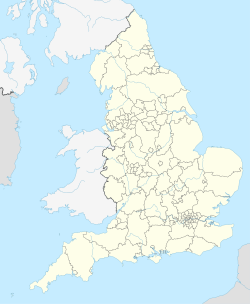
Ripon is a cathedral city and civil parish in North Yorkshire, England. The city is located at the confluence of two tributaries of the River Ure, the Laver and Skell. Within the boundaries of the historic West Riding of Yorkshire, the city is noted for its main feature, Ripon Cathedral, which is architecturally significant, as well as the Ripon Racecourse and other features such as its market.

The Cathedral Church of St Peter and St Wilfrid, commonly known as Ripon Cathedral, and until 1836 known as Ripon Minster, is a cathedral in Ripon, North Yorkshire, England. Founded as a monastery by monks of the Irish tradition in the 660s, it was refounded as a Benedictine monastery by St Wilfrid in 672. The church became collegiate in the tenth century, and acted as a mother church within the large Diocese of York for the remainder of the Middle Ages. The present church is the fourth, and was built between the 13th and 16th centuries. In 1836 the church became the cathedral for the Diocese of Ripon. In 2014 the Diocese was incorporated into the new Diocese of Leeds, and the church became one of three co-equal cathedrals of the Bishop of Leeds.

Bradford Cathedral, or the Cathedral Church of St Peter, is an Anglican cathedral in Bradford, West Yorkshire, England, one of three co-equal cathedrals in the Diocese of Leeds alongside Ripon and Wakefield. Its site has been used for Christian worship since the 7th century, when missionaries based in Dewsbury evangelised the area. For many centuries it was the parish church of St Peter and achieved cathedral status in 1919. The cathedral is a Grade I listed building.
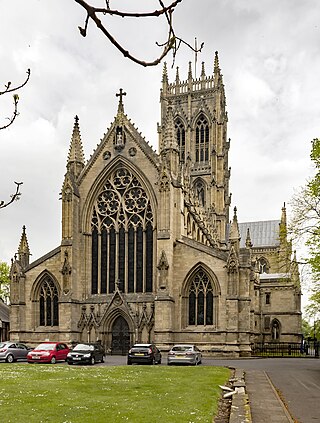
Doncaster Minster, formally the Minster and Parish Church of St George, is the Anglican minster church of Doncaster, South Yorkshire, England. It is a grade I listed building and was designed by architect designer George Gilbert Scott. The church was built in 1854–1858 to replace an earlier building destroyed by fire. It is an active place of worship and has a Schulze organ, a ring of eight bells, and a celebrated clock by Dent. The church is one of two parish churches to have minster status in South Yorkshire. The other is the minster church of Rotherham.

Leeds Cathedral, formally the Cathedral Church of St Anne, also known as Saint Anne's Cathedral, is the cathedral of the Roman Catholic Diocese of Leeds, and is the seat of the Roman Catholic Bishop of Leeds. It is in the city of Leeds, West Yorkshire, United Kingdom. The city of Leeds does not have a Church of England cathedral although it is in the Anglican Diocese of Leeds. The cathedrals of the Anglican diocese are in Ripon, Wakefield and Bradford. The city instead has a Minster which is similar to nearby Dewsbury Minster and Halifax Minster, all of which are parish churches.

Leeds Minster, also known as the Minster and Parish Church of Saint Peter-at-Leeds is the minster church of Leeds, West Yorkshire, England. It stands on the site of the oldest church in the city and is of architectural and liturgical significance. A church is recorded on the site as early as the 7th century, although the present structure is a Gothic Revival one, designed by Robert Dennis Chantrell and completed in 1841. It is dedicated to Saint Peter and was the Parish Church of Leeds before receiving the honorific title of "Minster" in 2012. It has been designated a Grade I listed building by Historic England.
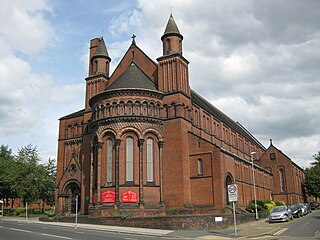
St Aidan's Church in Harehills, Leeds, West Yorkshire is a Church of England parish church built in 1894. It is a large Victorian basilica-type red-brick building which is Grade II* listed. A church hall is adjacent. The architects were Johnson and Crawford Hick of Newcastle.

St Wilfrid's Church, Harrogate is an Anglican parish church in the town of Harrogate, North Yorkshire, England. It is a Grade I listed building, the only such building in Harrogate. It was designed by the architect Temple Lushington Moore and is one of his best-known works. It is designated as a "Major Parish Church" and is the 38th largest parish church in England.
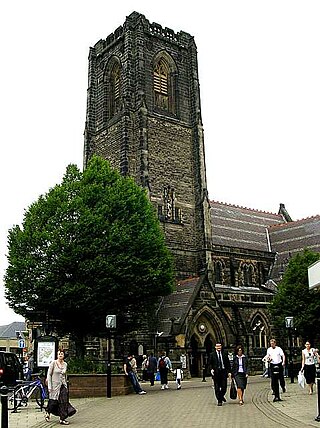
St Peter's Church, Harrogate is a parish church in the Church of England located in Harrogate, North Yorkshire, England. It is a Grade II listed building.

Christ Church, High Harrogate is a parish church in the Church of England located in Harrogate, North Yorkshire, England. It was the first church building to be built in Harrogate and is today home to a thriving congregation and – along with the attached Parish Centre – an important focus of community activities.

St Nicholas Church is in the village of Wrea Green, Lancashire, England. It is an active Anglican parish church in the deanery of Kirkham, the archdeaconry of Lancaster and the diocese of Blackburn. Its benefice is combined with those of St Matthew, Ballam and St Michael, Weeton. The church is recorded in the National Heritage List for England as a designated Grade II listed building.

St Bartholomew's Church, Armley is a parish church in the Church of England in Armley, West Yorkshire. The church is one of two Church of England churches in Armley; the other being Christ Church. Worship at St Bartholomew's is firmly rooted in the Anglo-Catholic tradition of the Church of England with a solemn mass being celebrated weekly.

St Peter's Church is in the village of Stainforth, North Yorkshire, England. It is an active Anglican parish church in the deanery of Bowland, the archdeaconry of Craven, and the Diocese of Leeds. Its benefice is united with those of St Oswald, Horton-in-Ribblesdale and St John the Evangelist, Langcliffe. The church is recorded in the National Heritage List for England as a designated Grade II listed building.

St Andrew's Church is in High Street, Starbeck, Harrogate, North Yorkshire, England. It is an active Anglican parish church in the deanery of Harrogate, the archdeaconry of Richmond, and the Diocese of Leeds. The church is recorded in the National Heritage List for England as a designated Grade II listed building. The current vicar is the Reverend Phil Carman.
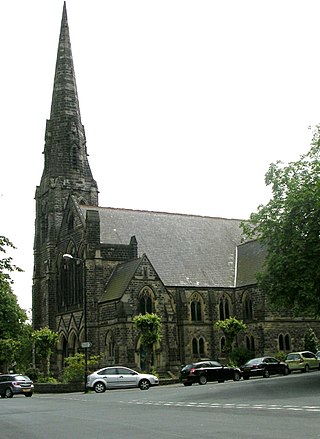
Trinity Methodist Church, Harrogate is located in Harrogate, North Yorkshire, England. It is a Grade II listed building.

Holy Trinity Parish Church is the parish church of Sutton Coldfield, West Midlands, England. It is Grade I listed and gives its name to the ward in which it stands, Sutton Trinity.
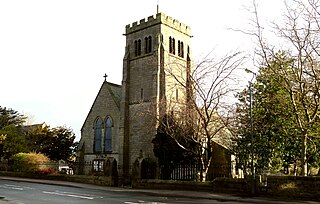
The Church of St Michael and All Angels, Beckwithshaw, North Yorkshire, England, also known as Beckwithshaw Church, is an Anglican church built and furnished between 1886 and 1887 by William Swinden Barber in the Gothic Revival style as part of the Arts and Crafts movement. The stained glass windows in the same style were added in 1892. The church is listed as a Grade II historic structure; it is a pristine and unchanged example of an Arts and Crafts church retaining all its original furnishings, apart from one missing statue. However, in 2018 the church officers gained planning permission for changes which included removing all of the original pews. The first vicar of this church, from 1887 to 1894, was Charles Farrar Forster.
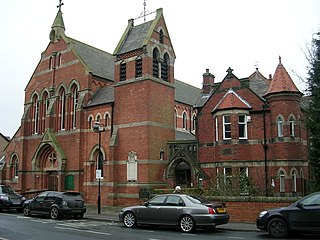
Our Lady Immaculate & St Robert's Catholic Church, Harrogate is a parish church in the Roman Catholic Church located in Harrogate. It is a Grade II listed building.

The Church of St Thomas the Apostle, Killinghall, is an Anglican parish church in Killinghall, North Yorkshire, England. It was designed in 1879 by William Swinden Barber when the parish of Ripley was split to create the additional parish of Killinghall, and a new building was required to accommodate a growing congregation. It was opened in 1880. Among the early vicars posted in this benefice were two canons, Sydney Robert Elliston and Lindsay Shorland-Ball, and the Venerable Robert Collier, an Irish missionary who served in India and Africa.

The Church of All Saints, Harlow Hill, Harrogate, North Yorkshire, England, is a grade II listed mission church, or chapel of ease, completed in 1871 on land donated by Henry Lascelles, 4th Earl of Harewood, within the parish of St Mary. It was consecrated by the Bishop of Ripon in 1871. The building was designed with a round bell tower, in Gothic Revival style, by Isaac Thomas Shutt and Alfred Hill Thompson. After some years of closure due to structural problems, as of 2014 it was being restored for use by a funeral director's company.

